How small spaces can benefit the bottom line of a retail business, opening up new and profitable markets with a clever use of kitchen furniture
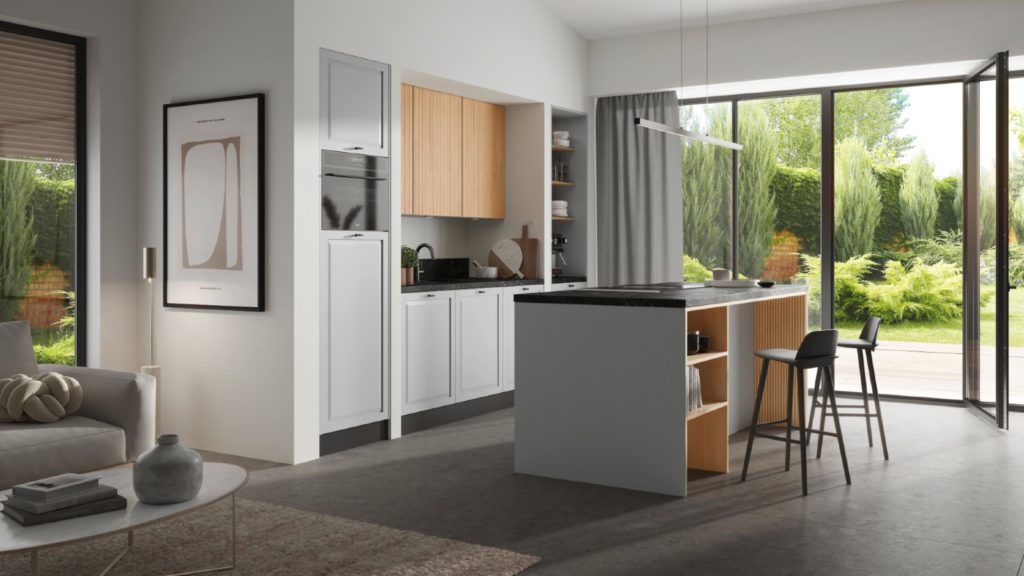
The Shaker-style Pavilo door from Rotpunkt features a cassette front with rounded edges inside and out, and is shown in Just Grey.
While the focus of a kitchen retail showroom is often on large, lifestyle kitchens, smaller-scale projects could prove lucrative.
It may see retailers broaden their church of clients, which could be helpful if footfall has slowed, providing kitchens where building costs to create extra floorspace could be prohibitive on a restricted budget.
Sponsored Video
However, small doesn’t necessarily mean low cost, as compact kitchen could also equally see a move into new markets, whether that’s for second kitchens, contract developments or even yachts!
Replace but no space
Bill Miller, managing director of Kitchen Bathroom Buying Group (KBBG), which is part of European Der Kreis, says his retail members report consumers are replacing kitchens in their current space.
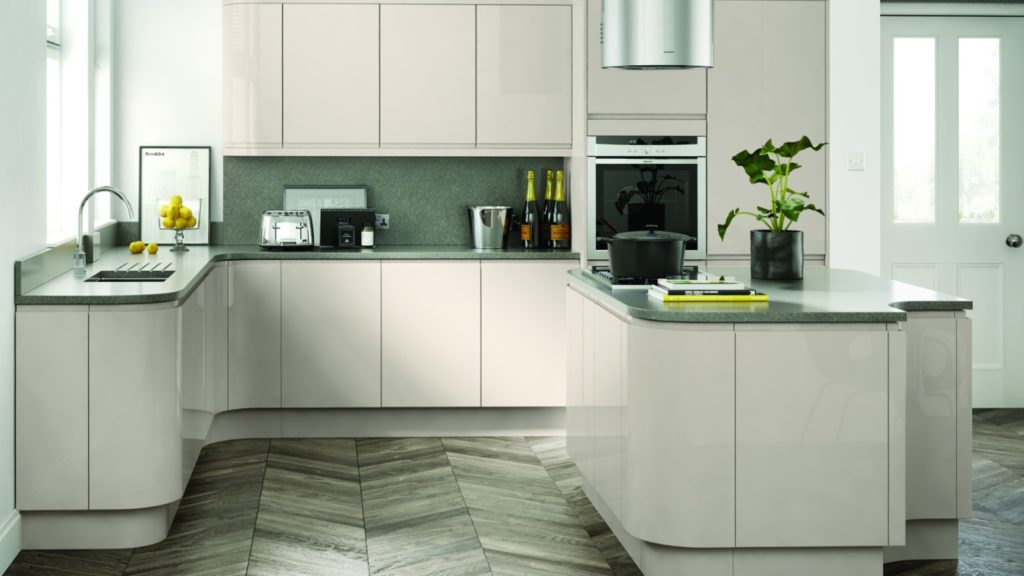
Part of the TKC Lucente gloss handleless range, with J Pull designed doors, is this scheme in a Cashmere finish. The neutral and timeless shade can work well in small kitchen space, as the reflective surface can give the illusion of light and space.
He comments: “Der Kreis members have reported that this year, due to rising interest rates customers are purchasing a new kitchen for their current home instead of moving house and that the new kitchen is going into an existing space rather than an extension.
“It was the popularity of kitchen extensions that drove new kitchen sales over the last three years, therefore as consumers’ interest in extending their home cools, it will be interesting to see what impact this had on the kitchen market. Kitchen retailers will certainly need to adapt to meet his change.”
And his view is supported by commercial director of Crown Imperial Tony McCarthy who adds: “As a furniture manufacturer was have seen an increase in interior storage organisation, underlining the Rated People’s home improvement report that ‘repurposing space will be a key trend for 2023’.”
Adding second kitchen
However, smaller spaces don’t have to simply be a cheaper option but can also offer valuable additional kitchen furniture sales, providing multiple sales for one home.
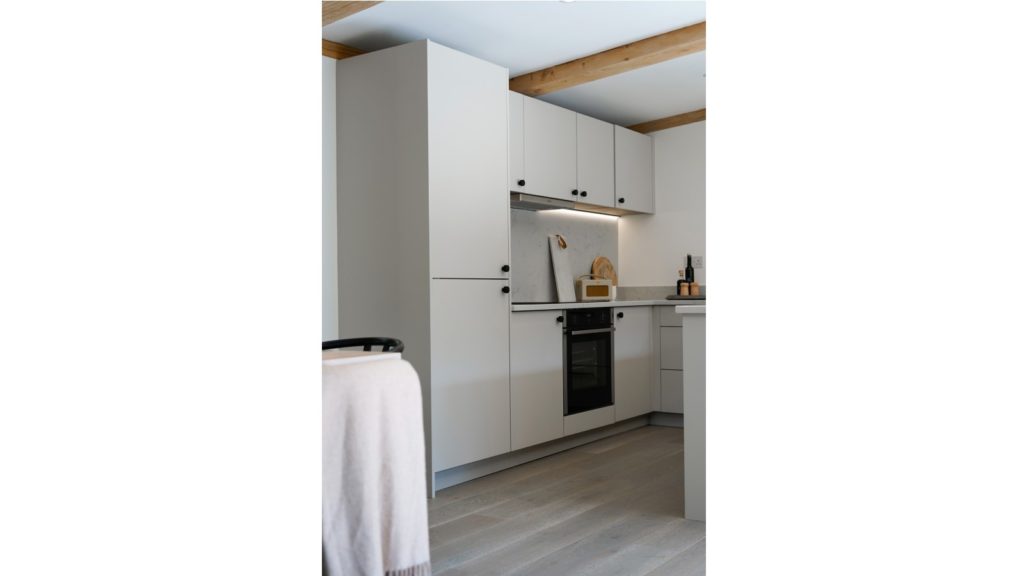
Designed for the summer house in the grounds of an eight-bedroom, Georgian property, Daval designed the space with Scandinavian design cues using its Mayfair collection in Talpa.
Compact kitchens could provide a second cooking facility for homes where the main kitchen is designed as a lifestyle space, added to garden rooms or for homes inhabited by multi-generations, perhaps installed in annexes.
Managing director of Daval Furniture Simon Bodsworth states: “We are certainly seeing growth in the hidden kitchen and second kitchen market for business owners who work from home or individuals who have a hybrid working pattern.
“Tyrpically, these clients have already invested in developing outbuildings into home offices or extra spaces for entertaining or hobbies and the next step is to add an extra layer of comfort with a luxe kitchenette separate from the family kitchen.”
Entering new markets
Considering compact kitchens could also open the doors to new markets for retailers, such as residential contracts, and particularly for one-person dwellings.
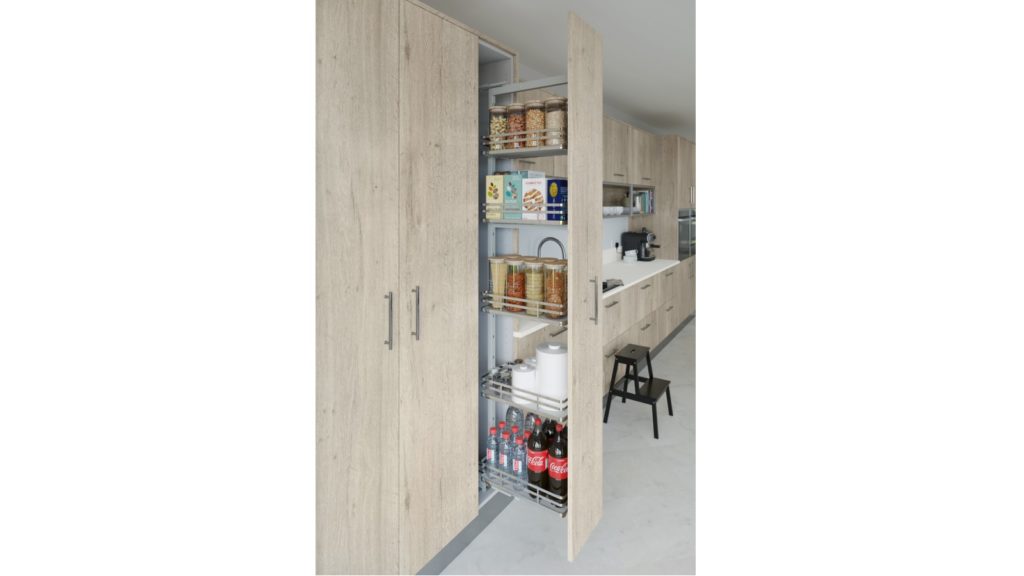
A Crown Imperial Spaceworks+ larder pull-out has been styled here in Textura Oak. It can be used as a space saver for smaller kitchens
Director at independent kitchen retailer Glotech Chris Reeves adds: “We think it’s vital for every kitchen retailer to give serious consideration to branching out into the contract interiors sector as part of their growth strategy and commercial succession planning.
“So we recommend that you view small kitchen expertise as a lucrative revenue steam to investigate.” He offers some statistics that support the future potential for small kitchen sales in newbuild.
“According to the ONS, with the UK population projected to rise to 69.2million by mid-2030 and to 71million by mid-2045, there is set to be even more opportunity to work with architects and builders on home which are tailored to specific demographics which favour smaller kitchens such as student accommodation, retirement living or social housing.”
However, it’s not only residences where expertise in small kitchen design could prove to be lucrative, as it could even opens the door to private transport specification.
Northern regional manager for SieMatic UK Samantha Povey explains: “Luxury compact spaces such as yachts or private jets do utilise luxury finishes and smart, flexible design elements, so high net worth individuals can take their luxury kitchens with them, even when they travel.”
Aspirational designs
It answers the question if small kitchens can offer aspirational design similarly to large scale kitchens.
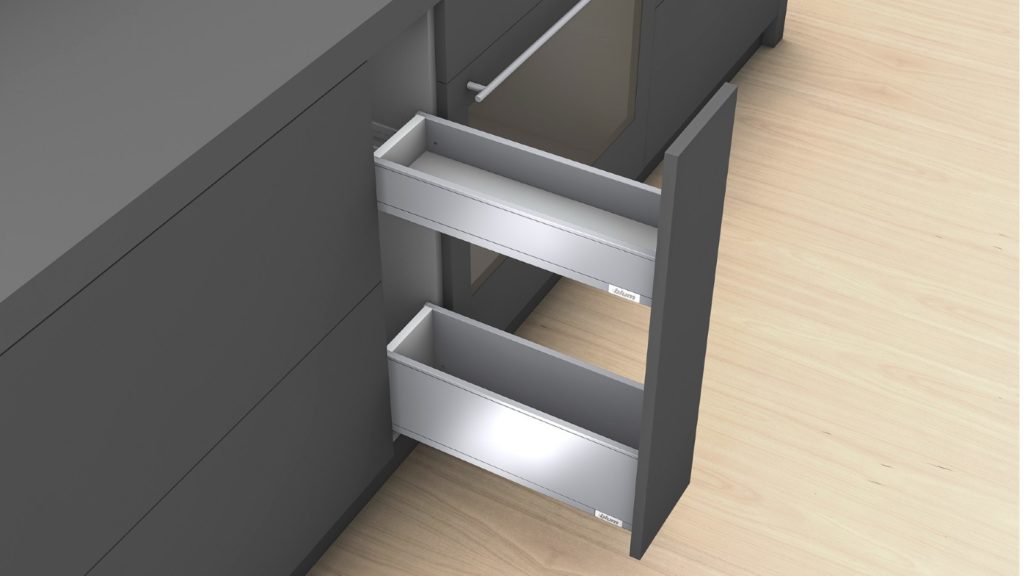
Blum provides the Space Twin for gaps at the end of a run of units, measuring from 200mm
CEO of Scavolini Fabiana Scavolini adds: “It is possible to create an inspirational kitchen in a small space. In fact, having a limited area can force homeowners to be more creative with their design choices and make the most out of every inch.”
These views are supported by head of UK operations Rotpunkt Matt Phillips who states: “I’m a firm believer that good design has no limits, so yes you absolutely can, thanks to the multifunctional, modular furniture on the market.”
Storage is key for all kitchen furniture, but particularly small spaces, as national sales manager UK of Keller Kitchens Tim Spann continues: “When tall cabinets are appropriate for use, consider pull-outs or cage systems for space efficiency.
“For example, a slim pull-out larger unit can give a good amount of organisable space.” And to achieve visual lightness in the space, industry experts point to the importance of glass fronted cabinets and open shelves.
Marketing manager at TKC Neil Taggart explains: “With a considered design layout, great storage, open shelving and clever use of lighting any colours, textures and materials should work well in any space.”
However, to capitalise on compact kitchen sales, industry experts suggest retailers show small-scale alongside lifestyle displays.
Fabiana Scavolini says: “By including inspiring smaller displays, independent kitchen retailers can encourage those in small city apartments to consider their offerings instead of assuming that only DIY sheds can cater to their needs.”
So accomplished retailers can start now, taking small steps towards new markets.



